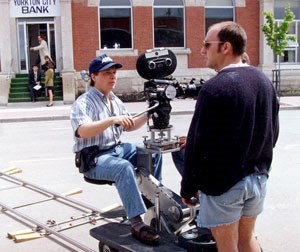Submitted by Kathleen Morrell
The history of the festival has been like a stream with its rocky rapids and smooth flow of deep shimmering waters. The 1960s saw the rocky times when attendance at screenings fell and the festival faced closure. In the 1970s, leadership diverted the festival around the danger of collapse to smoother waters.
By the late 1980s, however, the event was once more in troubled waters.
The festival, like many arts organizations, struggled to stay afloat. Government, faced with mounting deficits, cut budgets to all its departments and grants to cultural groups. The event lost 40 per cent of its lottery funding by 1993. The executive director spent more than four months each year on grant applications, the work sometimes to no avail.
For a while, the festival held parallel events to attract local people into the wider world of film, but it didn't seem to work. People flocked to see the gun fight or jousting on 2nd Avenue, but neither had little to do with film. The festival hosted feature length films at the Tower Theatre, but the audience proved sparse.
Then the Festival encountered the stream of new media. Filmmakers looked to YouTube for their audience. Net Flicks and Paper View offered films any time, any where. It all made a difference. The Festival's response was to organize the Golden Sheaf Award tours, a program where films were distributed to various organizations across the province. The philosophy was "get the films to the audience rather than the audience to the films." It was a positive re-launch of festival fortunes.
In 2008, Richard Gustin, an SCN executive, came to the festival board at the invitation of then board chairperson, Dean Sauer of CBC.
"I told Dean I was coming on the board with the idea that we fix it or fold it," Gustin says, now co-chairperson of the board of the Yorkton Film Festival. "I didn't want to see it fold. It was the only Saskatchewan event of its type, but we needed a new map, a new direction."
The waters were definitely choppy.
Given the frustrations, the board struggled with many things, but the discussion came back to the central question - what was the function of the Festival in the present. In the past when the Festival was founded, there was no television, no internet and so people flocked to films hosted by the Yorkton Film Council.
"Today, we are in a universe of 150 television channels and a gazillion things on the internet," Gustin adds. "Film and video are everywhere."
This is the reality of the film industry today. Yet despite the changes in technology, the filmmaker still returns to the fundamental goal, the desire to communicate, to tell a story. His role is important.
To meet the challenges, Yorkton is becoming a media or screen festival," Gustin says.
"We are establishing competition categories for the new media. We want to attract younger filmmakers and students. We want to bring in our fellow travelers, writers and musicians. We need to build and strengthen the community through a collaborative process with like-minded and not-so-like minded people."
"The Festival fosters the building of community," Gustin continues. "The Golden Sheaf Awards allow us to celebrate our successes. The workshops provide the formal learning experience. The events of the festival allow for fellowship, to make the contacts and friendships that foster growth and business.
"The 65th gives us the chance to look forward, to decide what's next for the Festival. The river promises an exciting journey."




